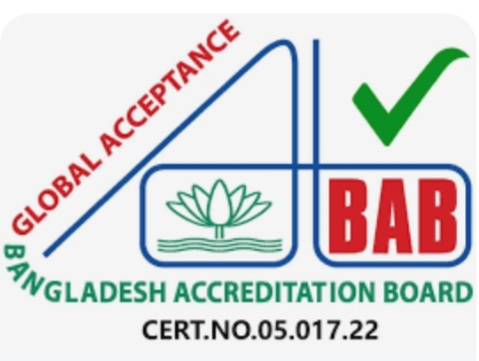
Introduction:
Quality and safe healthcare service is not only the expectation
but also right to the patient. Medical laboratory tests are an integral part of
healthcare service delivery. In developed countries, maximum medical decisions
are taken according to the laboratory reports. Authentic lab report is very
much important in the early detection, diagnosis, and treatment of diseases. It
also helps doctorsto evaluate
treatments and monitor disease conditions for further planning of patientcare.
Regular health screening through laboratory tests play an important role in
getting preventive treatment whichcan avoid future disease complexity. Hence, quality
laboratory test results are essential to ensure the best outcome of both
preventive and curative healthcare management. Only, an accredited laboratorycan offer the quality test results. So, Laboratory
accreditation is a formal recognition earned by organizations proving they are
qualified, competent,and comply with
international standards. 
Although many health
care facilities are operating in Bangladesh, but various complaints have been
raised so far by the patients and doctors, about its quality, including
inconsistent laboratory reports. As a result, many people are going abroad for
treatment due to lack of trust. Therefore, a huge amount of money is draining
out of the country every year. Also creating a negative image of our country's
healthcare services in the outside world.
To ensuring
reliability of test results as well as increase the efficiency, risk reduction,
and cost effectiveness are the major challenges for healthcare laboratories.
Only a comprehensive quality management system (QMS) can enable to produce
laboratory testing results are internationally accepted. QMS is a well designated
system to direct and control an organization and its resources to ensure the
consistency and efficacy of the laboratory services. It includes the laboratory
organization, staff training, quality assurance, sample collection, transport,
processing, analysis, reporting, and customer satisfaction.
Goals
of quality management system;
·
To meet the regulatory
requirements of the accredited authority.
·
To achieve the
national and international accreditations in medical laboratories.
·
To operate the laboratory
services efficiently and effectively.
· To continue the quality improvement of medical laboratories.
Laboratory accreditation:
Accreditation is a formal approval and recognition by an authoritative and independent conformity assessment body to demonstrate the competencies to meet specified requirements to perform a specific task. The specified requirements for a medical laboratory are the ISO-15189 standards. The ISO-15189 Medical laboratories-requirements for quality and competence is an international standard that specifies the QMS requirements particular to medical laboratories. The standard was developed by “Technical Committee 212 (ISO/TC-212) based on ISO/IEC-17025:1999 and ISO-9001. The first version of the standard was published in 2003, and it was revised in 2007. The third edition of the standard was published in 2012. And the latest (fourth) edition is published in 2022.
Importance
and benefits of medical laboratory accreditation in Bangladesh.
People get
confidence to do the laboratory tests from an accredited laboratory. Thereby
tendency to go abroad for medical checkup & treatment will be reduced consequently
foreign currency will be saved. Specific benefits include but not limited to;
·
Ensure national and
international recognition and access to
the global marketplace for business development and promotion.
· Accredited laboratories can become more accountable its patients and
doctors.
·
Assure reliability of test
results, safety & confidentiality of patient.
·
Increase doctor’s confidence
in laboratory reports & so the same as
in company reputation.
·
Ensure better control in
laboratories operation management.
·
Reduce wastage of time,
money and materials as well as ensuring
operational sustainability.
·
Recognize staff competencies
and increase their bright career opportunities.
· Ensure better support in the event of legal challenges.
BAB-medical
laboratory accreditation:
BAB has been a full member of the Asia Pacific Accreditation Co-operation (APAC) since December, 2019 for providing Medical Laboratory Accreditation under ISO-15189 Standards. BAB has a Mutual Recognition Agreement (MRA) with the International Laboratory Accreditation Co-operation (ILAC) since January, 2020 for providing Medical Laboratory Accreditation under ISO-15189 Standards.
Bangladesh Accreditation Board (BAB) and
other accreditation bodies:
- The BAB is an
autonomous government agency responsible for providing accreditations to
Bangladeshi laboratories, testing centers, and certification bodies. It was
established under Ministry of Industries on 6-September, 2006. BAB has been a
full member of the Asia Pacific Accreditation Co-operation (APAC) and
International Laboratory Accreditation Co-operation (ILAC) since 2015. As a result, the test, calibration, and
inspection report from any BAB's Accredited Laboratory will get international
recognition.
- International
Accreditation Forum (IAF) is the highest recognized certification body
worldwide. BAB is in the process of acquiring IAF membership.
- National
Accreditation Board for Testing and Calibration Laboratories (NABL) provides
accreditation to Conformity Assessment Bodies in India.
- The Collage
of American Pathologists (CAP) provides accreditation and
proficiency testing to medical laboratories through its laboratory quality
solutions programs.
- Joint
Commission International (JCI),
- United
Kingdom Accreditation Services (UKAS),
- National
Association of Testing Authorities in Australia (NATA).
BAB-medical laboratory accreditation
processes:
- Step 1: Registration
and appointment of Case Officer after receiving the application.
- Step 2: Adequacy
audit/adequacy verification.
- Step 3:
Pre-assessment of the applicant organization by the assessment team.
- Step 4: Completion
of assessment by the assessment team at the applicant organization.
- Step 5: Review of the assessment report and final evaluation of the accreditation.
- Step 6: Sign the Accreditation Certificate based on the recommendation/s of the Accreditation Committee and display on the BAB website.
Implementation of BAB-medical laboratory accreditation processes:
·
Gaining fast support from
the higher management.
·
Baseline/gap assessment
against ISO-15189 standards and recommendations.
·
Development of action plan
and agreed timeframe.
·
Training of staff members
and management on ISO-15189 standards and its implementation.
·
Document creation, review,
approval, and adaptation into document control system.
·
Implementation and periodic monitoring
for its effectiveness.
·
Internal audit and evaluation through
corrective and preventive actions.
·
Management review and
support in submission of the application for accreditation.
Laboratory accreditation-Bangladesh perspective:
·
The
Clinical Laboratory Services of icddr,b has been accredited for ISO-15189 and
ISO-15190 since 2011 by the Bureau of Laboratory Quality Standards (BLQS) under
the Ministry of Public Health, Thailand. They are the ever first accredited
laboratory in Bangladesh.
· Thyrocare Bangladesh Limited has been accredited
under College of American Pathologists. They are the first CAP accredited
laboratory in Bangladesh.
· Lab Aid Limited has also been accredited under
College of American Pathologists. They are the second CAP accredited laboratory
in Bangladesh.
· As a part of hospital accreditation Evercare
laboratory has been accredited under JCI.
· Other accredited laboratories under BAB;
· United Hospital (2014), Lab Aid Limited (2017), Epic Healthcare (2019), Praava Health (2022), Khwaja Yunus Ali Medical College & Hospital (2022), DMFR (2023), Ibn Sina (2023).
Conclusion:
Health
care delivery is a daunting challenge area of the Bangladesh's healthcare
systems. Bangladesh has a good healthcare network covering both rural and urban
areas, but lagging behind in terms of quality.
Let us think and work together for the day when maximum medical laboratories have achieved accreditations by maintaining highest possible standards. Healthcare service seekers from around the world choose Bangladesh for receiving their service due to highly competent doctors, and the quality and safe laboratory services at low cost.










